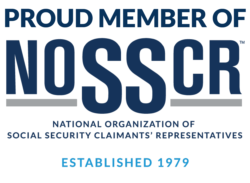Federal court review of denied SSDI and SSI claims
by Eric Slepian
At Slepian Smith Ellexson, PLLC, our lawyers represent people across Arizona applying for Social Security Disability Insurance and Supplemental Security Income, known as SSDI and SSI respectively, at all levels of application and appeal. A claimant has four levels of consideration of their application for benefits before the Social Security Administration, or SSA. After a final decision by the SSA denying the claim, the applicant has the right to request that the U.S. District Court review the agency’s denial of benefits.
Evolution of an SSDI or SSI claim before the agency
Administrative stages before the SSA:
- Application: The SSA works with a state agency called Disability Determination Services, or DDS, to review the medical and vocational evidence in an initial SSDI or SSI application.
- Reconsideration: SSA often denies initial applications, after which the claimant may request reconsideration, meaning that different people review the claimant’s file and make another eligibility decision.
- Administrative law judge hearing: If the SSA again denies the claim at reconsideration, the claimant may request a hearing before an administrative law judge, called an ALJ, an agency employee who listens to witnesses and considers written evidence to decide the claim.
- Appeals Council: The last stage of SSA review is by the Appeals Council, which conducts a review of the written record to make the fourth decision on the claim.
Federal court review
Federal law provides that when the agency’s final decision is a denial, the claimant may file a petition in U.S. District Court to review the agency’s handling of the claim. The SSA provides the entire agency file, including medical records and a transcript of the ALJ hearing. There are two parts to the court’s review.
Substantial evidence
First, the court reviews the record completely to determine if “substantial evidence” supported the agency’s decision. The U.S. Supreme Court defines substantial evidence as “more than a mere scintilla, but less than a preponderance.” Substantial evidence is that which a reasonable person could think is adequate to support the SSA’s decision.
Legal error
Second, the court reviews the agency’s decision-making for compliance with the law – whether the SSA made any legal errors. For example, did the ALJ apply the correct legal standard when they discounted the claimant’s testimony about the severity of their condition, including subjective (not measurable or observable) symptoms like pain or fatigue that the ALJ can only discount for clear, convincing reasons?
As explained in the U.S. District Court for the District of Arizona’s January 2019 opinion in Sorber v. Commissioner of Social Security Administration, the court uses the “harmless error doctrine” when analyzing whether the ALJ’s decision complied with the law. In other words, if there was a legal error but it was not serious enough to change the decision, it is not a basis for reversing the decision so long as substantial evidence supports the ALJ’s ultimate decision.
The District Court may affirm, modify or reverse the SSA’s final decision denying benefits. The court may remand (send back to the agency) the case and order the SSA to hold another hearing if disability is not clear from the record. Alternatively, if certain standards have been met, the court may remand the case and order the SSA to calculate and award benefits.
Should the District Court affirm the SSA’s denial of benefits, the claimant may appeal to the U.S. Court of Appeals (in Arizona, the 9th Circuit) and the U.S. Supreme Court.
(The Sorber decision is available on Westlaw at 362 F.Supp.3d 712.)



